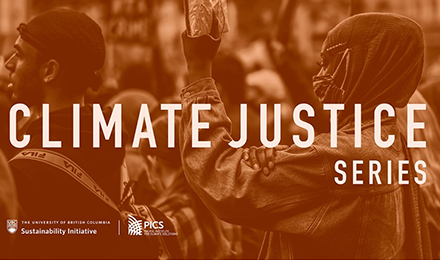Who does climate change impact most?
Countries and peoples that are least responsible for causing climate change are the ones suffering most from its effects. Join students, staff, and community leaders for an exploration of what climate justice means and why it is so critical to climate solutions. Learn about climate justice in Africa, climate justice as a threat to Indigenous sovereignty, BC’s oil tanker and pipeline projects and climate justice, and the global policy framework for acting on climate.
Topics and Guests
Climate Justice presented by Kathryn Harrison.
Climate Justice in Africa presented by Temitope Onifade.
Climate Change as a Threat to Indigenous Sovereignty presented by Terri-Lynn Williams-Davidson
BC Fossil Fuel Projects and Climate Justice by Eugene Kung

